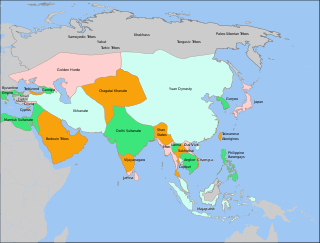See also
- George Tupou I of Tonga (c. 1797–1893)
- King George (disambiguation)
George I or 1 may refer to:
Albert I may refer to:
Constantine most often refers to:
Year 1118 (MCXVIII) was a common year starting on Tuesday of the Julian calendar.

Year 1335 (MCCCXXXV) was a common year starting on Sunday of the Julian calendar.
George II or 2 may refer to:

Duklja was a medieval South Slavic state which roughly encompassed the territories of modern-day southeastern Montenegro, from the Bay of Kotor in the west to the Bojana river in the east, and to the sources of the Zeta and Morača rivers in the north. First mentioned in 10th– and 11th-century Byzantine chronicles, it was a vassal of the Bulgarian Empire between 997 and 1018, and then of the Byzantine Empire until it became independent in 1040 under Stefan Vojislav who rose up and managed to take over territories of the earlier Serbian Principality, founding the Vojislavljević dynasty. Between 1043 and 1080, under Mihailo Vojislavljević, and his son, Constantine Bodin, Duklja saw its apogee. Mihailo was given the nominal title King of Slavs by the Pope after having left the Byzantine camp and supported an uprising in the Balkans, in which his son Bodin played a central part. Having incorporated the Serbian hinterland and installed vassal rulers there, this maritime principality emerged as the most powerful Serb polity, seen in the titles used by its rulers. However, its rise was short-lived, as Bodin was defeated by the Byzantines and imprisoned; pushed to the background, his relative and vassal Vukan became independent in Raška, which continued the fight against the Byzantines while Duklja was struck with civil wars. Between 1113 and 1149 Duklja was the centre of Serbian–Byzantine conflict, with members of the Vojislavljević as protégés of either fighting each other for power. Duklja was then incorporated as a crown land of the Grand Principality of Serbia ruled by the Vukanović dynasty, subsequently known as Zeta, remaining so until the fall of the Serbian Empire in the 14th century.
Michael I may refer to:
Mihajlo is a South Slavic variant of the name Michael, often found among Serbs. Cognate names include Mihailo and Mijailo.
Radoslav is a common Slavic masculine given name, derived from rad- and slava, both very common in Slavic dithematic names. It roughly means "eager glory". It is known since the Middle Ages. The earliest known Radoslav was a 9th-century Serbian ruler. It may refer to:
The Vukanović dynasty, was a medieval Serbian dynasty that ruled over inner Serbia, centered in the Raška region, during the 11th and 12th century. Several members of the Vukanović dynasty also ruled in some other regions. The house may have descended from the Vojislavljević dynasty of Duklja. Vukanović dynasty was later succeeded in Serbia by the closely related Nemanjić dynasty.
Otto IV may refer to:

George is a masculine given name derived from the Greek Georgios. The name gained popularity due to its association with the Christian martyr, Saint George, a member of the Praetorian Guard who was sentenced to death for his refusal to renounce Christianity, and prior to that, it might have been a theophoric name, with origins in Zeus Georgos, an early title of the Greek god Zeus. Today, it is one of the most commonly used names in the Western world, though its religious significance has waned among modern populations. Its diminutives are Geordie and Georgie, with the former being limited primarily to residents of England and Scotland. The most popular feminine forms in the Anglosphere are Georgia, Georgiana, and Georgina.
Euphemia of Kuyavia was a Kuyavian princess, who was Queen consort of Galicia-Volhynia.
Maria of Galicia was a princess of Galicia-Volhynia and a member of the Rurik Dynasty. She was sister to Leo II of Halych and Andrew of Halych, daughter of Yuri I of Galicia and his second wife, Euphemia of Kuyavia. She assisted her son king Boleslaus George II of Halych in ruling Galicia.
Henry I may refer to:
George of Duklja or Đorđe of Duklja may refer to:
Vladimir of Duklja may refer to:
Michael of Duklja may refer to: